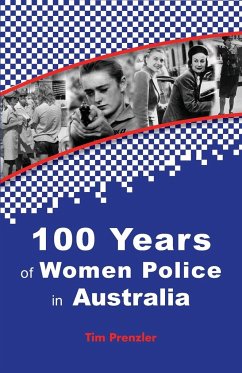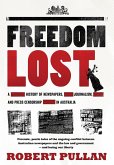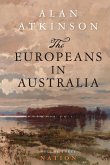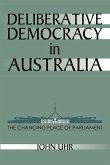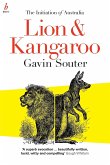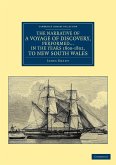Tim Prenzler
One Hundred Years of Women Police in Australia
Tim Prenzler
One Hundred Years of Women Police in Australia
- Broschiertes Buch
- Merkliste
- Auf die Merkliste
- Bewerten Bewerten
- Teilen
- Produkt teilen
- Produkterinnerung
- Produkterinnerung
In 2015 Australia celebrates the centenary of the country's first appointment of women police. This fascinating book presents for the first time the story of 100 years of Australian women police. A vital contribution to Australian history as well as modern policing and policy, the book concludes with a simple recipe for eliminating discrimination and optimising the contributions of women to police work.
Andere Kunden interessierten sich auch für
![Freedom Lost Freedom Lost]() Robert PullanFreedom Lost44,99 €
Robert PullanFreedom Lost44,99 €![The Europeans in Australia The Europeans in Australia]() Alan AtkinsonThe Europeans in Australia45,99 €
Alan AtkinsonThe Europeans in Australia45,99 €![Deliberative Democracy in Australia Deliberative Democracy in Australia]() John UhrDeliberative Democracy in Australia51,99 €
John UhrDeliberative Democracy in Australia51,99 €![Early Experiences Of Colonial Life In South Australia Early Experiences Of Colonial Life In South Australia]() John Wrathall BullEarly Experiences Of Colonial Life In South Australia32,99 €
John Wrathall BullEarly Experiences Of Colonial Life In South Australia32,99 €![Lion & Kangaroo Lion & Kangaroo]() Gavin SouterLion & Kangaroo34,99 €
Gavin SouterLion & Kangaroo34,99 €![Germans Germans]() Germans38,99 €
Germans38,99 €![The Narrative of a Voyage of Discovery, Performed in His Majesty's Vessel the Lady Nelson in the Years 1800, 1801, and 1802, to New South Wales The Narrative of a Voyage of Discovery, Performed in His Majesty's Vessel the Lady Nelson in the Years 1800, 1801, and 1802, to New South Wales]() James GrantThe Narrative of a Voyage of Discovery, Performed in His Majesty's Vessel the Lady Nelson in the Years 1800, 1801, and 1802, to New South Wales43,99 €
James GrantThe Narrative of a Voyage of Discovery, Performed in His Majesty's Vessel the Lady Nelson in the Years 1800, 1801, and 1802, to New South Wales43,99 €-
-
-
In 2015 Australia celebrates the centenary of the country's first appointment of women police. This fascinating book presents for the first time the story of 100 years of Australian women police. A vital contribution to Australian history as well as modern policing and policy, the book concludes with a simple recipe for eliminating discrimination and optimising the contributions of women to police work.
Hinweis: Dieser Artikel kann nur an eine deutsche Lieferadresse ausgeliefert werden.
Hinweis: Dieser Artikel kann nur an eine deutsche Lieferadresse ausgeliefert werden.
Produktdetails
- Produktdetails
- Verlag: Australian Academic Press
- Seitenzahl: 166
- Erscheinungstermin: 31. August 2015
- Englisch
- Abmessung: 216mm x 140mm x 9mm
- Gewicht: 218g
- ISBN-13: 9781922117601
- ISBN-10: 1922117609
- Artikelnr.: 43748403
- Herstellerkennzeichnung
- Libri GmbH
- Europaallee 1
- 36244 Bad Hersfeld
- gpsr@libri.de
- Verlag: Australian Academic Press
- Seitenzahl: 166
- Erscheinungstermin: 31. August 2015
- Englisch
- Abmessung: 216mm x 140mm x 9mm
- Gewicht: 218g
- ISBN-13: 9781922117601
- ISBN-10: 1922117609
- Artikelnr.: 43748403
- Herstellerkennzeichnung
- Libri GmbH
- Europaallee 1
- 36244 Bad Hersfeld
- gpsr@libri.de
Tim Prenzler is Professor of Criminology and Program Coordinator of the Bachelor of Criminology and Justice at the University of the Sunshine Coast. From 2008 to 2014 he was a Chief Investigator in the Australian Research Council Centre of Excellence in Policing and Security, based at Griffith University, where he managed the Integrity Systems Project and worked in the Frontline Policing Project. He was also a foundation member of the School of Criminology and Criminal Justice at Griffith, from 1991. In 2002 he was the recipient of the Excellence in Policing Award, Most Significant Contribution to Advancing the Status of Women in Policing; Australasian Council of Women and Policing. His research interests include gender in policing, crime prevention, corruption prevention, and police and security officer safety.
"The weaker-sex snap up every opportunity of quitting the sacred-side of
the home. Independence is their cry - irresponsible independence. The
ambition is no doubt laudable, but is it desirable?"- The Sydney Stock and
Station Journal, 1915.
" Police have at all times been able to collect evidence of any nature
required in any cases. If women collected evidence, male police would have
to go over it afterwards to have it be of any use or complete it'" - Police
Inspector O'Sullivan, 1915
Policing has always been a tough job - dealing with criminals and the
constant threat of physical attack. Any woman who puts her hand up for the
role of protecting the community as a police officer, and manages to carry
out her duties in a competent and conscientious manner, in the teeth of a
myriad of external and internal challenges, is to be greatly admired. In
2015 Australia celebrates the centenary of the country's first appointment
of women police. Yet it was not until 1961 that all jurisdictions finally
had female officers.
Tim Prenzler, one of Australian' s leading research criminologists, has
spent 25 studying the long and tortuous path to equality and professional
recognition of Australia's women police. He has examined aspects of gender
relations in policing, barriers to women in recruitment, the work of equity
agencies, international comparisons of the status of women police, and
performance comparisons of male and female officers.
This fascinating book presents for the first time the story of 100 years of
Australian women police. Filled with quotes and extracts from reports and
correspondences of the time it sheds light on the conflicts, egos, biases,
social mores and heroic efforts of those involved in this story.
A vital contribution to Australian history as well as modern policing and
policy, the book concludes with a simple recipe for eliminating
discrimination and optimising the contributions of women to police work.
the home. Independence is their cry - irresponsible independence. The
ambition is no doubt laudable, but is it desirable?"- The Sydney Stock and
Station Journal, 1915.
" Police have at all times been able to collect evidence of any nature
required in any cases. If women collected evidence, male police would have
to go over it afterwards to have it be of any use or complete it'" - Police
Inspector O'Sullivan, 1915
Policing has always been a tough job - dealing with criminals and the
constant threat of physical attack. Any woman who puts her hand up for the
role of protecting the community as a police officer, and manages to carry
out her duties in a competent and conscientious manner, in the teeth of a
myriad of external and internal challenges, is to be greatly admired. In
2015 Australia celebrates the centenary of the country's first appointment
of women police. Yet it was not until 1961 that all jurisdictions finally
had female officers.
Tim Prenzler, one of Australian' s leading research criminologists, has
spent 25 studying the long and tortuous path to equality and professional
recognition of Australia's women police. He has examined aspects of gender
relations in policing, barriers to women in recruitment, the work of equity
agencies, international comparisons of the status of women police, and
performance comparisons of male and female officers.
This fascinating book presents for the first time the story of 100 years of
Australian women police. Filled with quotes and extracts from reports and
correspondences of the time it sheds light on the conflicts, egos, biases,
social mores and heroic efforts of those involved in this story.
A vital contribution to Australian history as well as modern policing and
policy, the book concludes with a simple recipe for eliminating
discrimination and optimising the contributions of women to police work.
"The weaker-sex snap up every opportunity of quitting the sacred-side of
the home. Independence is their cry - irresponsible independence. The
ambition is no doubt laudable, but is it desirable?"- The Sydney Stock and
Station Journal, 1915.
" Police have at all times been able to collect evidence of any nature
required in any cases. If women collected evidence, male police would have
to go over it afterwards to have it be of any use or complete it'" - Police
Inspector O'Sullivan, 1915
Policing has always been a tough job - dealing with criminals and the
constant threat of physical attack. Any woman who puts her hand up for the
role of protecting the community as a police officer, and manages to carry
out her duties in a competent and conscientious manner, in the teeth of a
myriad of external and internal challenges, is to be greatly admired. In
2015 Australia celebrates the centenary of the country's first appointment
of women police. Yet it was not until 1961 that all jurisdictions finally
had female officers.
Tim Prenzler, one of Australian' s leading research criminologists, has
spent 25 studying the long and tortuous path to equality and professional
recognition of Australia's women police. He has examined aspects of gender
relations in policing, barriers to women in recruitment, the work of equity
agencies, international comparisons of the status of women police, and
performance comparisons of male and female officers.
This fascinating book presents for the first time the story of 100 years of
Australian women police. Filled with quotes and extracts from reports and
correspondences of the time it sheds light on the conflicts, egos, biases,
social mores and heroic efforts of those involved in this story.
A vital contribution to Australian history as well as modern policing and
policy, the book concludes with a simple recipe for eliminating
discrimination and optimising the contributions of women to police work.
the home. Independence is their cry - irresponsible independence. The
ambition is no doubt laudable, but is it desirable?"- The Sydney Stock and
Station Journal, 1915.
" Police have at all times been able to collect evidence of any nature
required in any cases. If women collected evidence, male police would have
to go over it afterwards to have it be of any use or complete it'" - Police
Inspector O'Sullivan, 1915
Policing has always been a tough job - dealing with criminals and the
constant threat of physical attack. Any woman who puts her hand up for the
role of protecting the community as a police officer, and manages to carry
out her duties in a competent and conscientious manner, in the teeth of a
myriad of external and internal challenges, is to be greatly admired. In
2015 Australia celebrates the centenary of the country's first appointment
of women police. Yet it was not until 1961 that all jurisdictions finally
had female officers.
Tim Prenzler, one of Australian' s leading research criminologists, has
spent 25 studying the long and tortuous path to equality and professional
recognition of Australia's women police. He has examined aspects of gender
relations in policing, barriers to women in recruitment, the work of equity
agencies, international comparisons of the status of women police, and
performance comparisons of male and female officers.
This fascinating book presents for the first time the story of 100 years of
Australian women police. Filled with quotes and extracts from reports and
correspondences of the time it sheds light on the conflicts, egos, biases,
social mores and heroic efforts of those involved in this story.
A vital contribution to Australian history as well as modern policing and
policy, the book concludes with a simple recipe for eliminating
discrimination and optimising the contributions of women to police work.

